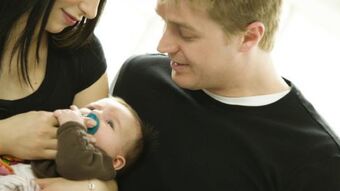Chancellor Urged to End the Discriminatory Tax Regime that Penalises NI Families
Marriage and Family
- Tax burden on one-earner married families 20 per cent greater than the OECD average
- Struggling families face highest effective marginal tax rate in western world
- Income tax burden 70 per cent more than a comparable French family, more than twice as much as a comparable US family and 15 times as much as that on a comparable German family.
- Government must ditch plans to raise personal allowance and use money to boost marriage allowance
The Chancellor is being urged to end the discriminatory tax regime that penalises families when compared to the other OECD countries.
New research, launched today in Parliament by the social policy charity CARE, lays bare the alarming truth about family taxation in the UK.
The report, ‘The Taxation of Families – International Comparisons 2016’, reveals that the tax burden faced by one-earner married couples with two children on the average wage is 20 per cent higher in Britain than the rest of the OECD.
But the picture for British one earner married couples with two children on 75 per cent average wage – those the Government has described as the just about managing, face the highest effective marginal rate in the developed world, a crippling 73 per cent.
This means that when such a family increase their incomes, they will only get to keep 27 pence from every additional pound earned. The rest will go to the government in tax, national insurance and lost benefits.
Mark Baillie, CARE for Northern Ireland Policy Officer
"In Northern Ireland a significant number of families are detrimentally impacted by an unfair tax regime that is prejudiced against single earner married couples.”
“In 2011, 78,729 single earner married couples were identified in Northern Ireland. Today this figure could be even higher. CARE calls upon Northern Irish MPs and Peers to use their influence at Westminster to seek changes to the tax system to mitigate the bias against families where one parent makes the investment to stay at home and raise the children, or care for elderly relatives."
Nola Leach, Chief Executive of CARE, commented: “The Government has previously said that it wants to support those families who are just about managing, but as our report shows, this group is still being discriminated against, by a punitive and unfair tax system. Astonishingly for those families on between half and three quarters of the OECD average wage, the marginal tax rates they face are the highest out of any country in this group. The problem we have identified is that our income tax system takes no account of family responsibilities - be they to a spouse or children - placing this burden almost entirely on the benefits system.”
Building on previous years, the report’s authors, tax experts Leonard Beighton, Don Draper and Alistair Pearson now include a chapter highlighting the ways different developed countries share out the income tax burden between families and singles.
It found that a one-earner married couple with two children on average wage pays 70 per cent more tax than a comparable French family, more than twice as much as a comparable US family and 15 times as much as that on a comparable German family.
By contrast the tax burden on a single person with no children on average wage is 9% less than the OECD average and 18 per cent less than the average for the 22 EU countries that are OECD members.
Nola Leach continued: “There is a disturbing individualism in our tax system. Its treatment of one-earner families with children on average wage is very unfavourable while its treatment of single people with no family responsibilities on the same wage is generous.”
The charity is calling on the Government to ditch its plans to spend £4 billion on raising personal allowances from £11.5 thousand to £12.5 thousand by 2020, but instead focus this money on families with children.
It argues that the best mechanism for this would be to significantly increase the marriage allowance for those with dependents, while moving towards a fully transferable allowance for all married couples in future years.
Nola Leach concluded: “If the Government is serious about helping struggling families, then it must act to reduce their tax burden. The simplest way to do this in the short term would be to use the billions earmarked for raising the personal allowance and channel this into increasing the marriage allowance.”
Ends
Notes to Editors:
For media inquiries, please contact Rachael Adams of CARE on 020 7227 4731 or Rachael.adams@care.org.uk
About Care:
CARE (Christian Action Research and Education) is a well-established mainstream Christian charity providing resources and helping to bring Christian insight and experience to matters of public policy and practical caring initiatives. CARE is represented in the UK Parliaments and Assemblies, at the EU in Brussels and the UN in Geneva and New York.
The Taxation of Families Report - International Comparisons 2016
The findings of the report were presented at a seminar in parliament on Tuesday morning (14 November) 11 am till 12 noon, Committee Room 3A.
Number of Single earner married couples in Northern Ireland taken from the last Northern Ireland Census here.




Share story
Chancellor Urged to End the Discriminatory Tax Regime that Penalises NI Families